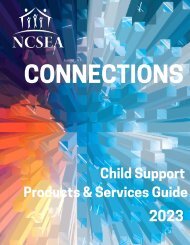April 2024 CSQ
Create successful ePaper yourself
Turn your PDF publications into a flip-book with our unique Google optimized e-Paper software.
support. Better-off fathers, on the other hand, often received nominal<br />
orders. In fact, many divorced fathers did not have a monthly support order<br />
at all. Part of my job as a state attorney was to review lump sum divorce<br />
decrees to determine whether they satisfied a “best interests of the child”<br />
standard. It was then common for wives to get the house and a lump sum<br />
settlement of a few thousand dollars in lieu of a monthly support order<br />
during a child’s minority.<br />
This also was before UIFSA was enacted. We operated under the Uniform<br />
Reciprocal Enforcement of Child Support Act (URESA). In order to enforce<br />
child support orders across state lines, both states had to enter into a<br />
compact—a little like a bilateral agreement in international cases. Part of<br />
my job was to review new URESA agreements. My interstate child support<br />
case wasn’t going to go anywhere because Minnesota didn’t have a<br />
URESA agreement with Pennsylvania. I didn’t even try to enforce my case.<br />
I represented the state in several class action lawsuits challenging federal<br />
laws enacted in 1981 and 1984. My first case was a constitutional<br />
challenge to the tax offset program. In another case, the state joined<br />
families in challenging federal sibling deeming rules, which required all<br />
children in the household to apply for AFDC and assign their child support<br />
rights. We had affidavits from several parents who decided to change<br />
custody rather than assign their support payments or who stopped paying<br />
child support altogether. During my career, I’ve been privileged to work on<br />
two U.S. Supreme Court cases.<br />
Program architecture underlies family experiences. In late 1994, I<br />
began working as a policy analyst at a national policy advocacy<br />
organization called the Center for Law in Social Policy (CLASP) in<br />
Washington, DC, and later became its family policy director. I specialized in<br />
family policy for 15 years, focusing on low-income families and fathers,<br />
domestic violence, and prison re-entry, including the Second Chance Act. I<br />
also focused on the guts of the child support program: systems<br />
implementation, program structure, and financing. A major part of my job<br />
was legislative advocacy. I was often on the hill and in the media, and<br />
coordinated closely with state directors. I had a hand in almost every child<br />
support law passed by Congress between 1996 and 2009, when I became<br />
OCSS commissioner.<br />
1994 was truly an incredible time to return to the child support program.<br />
Three weeks into the job, I went to my first NCSEA policy forum. The<br />
conference was held at a pivotal point in the program’s history: the shift to















